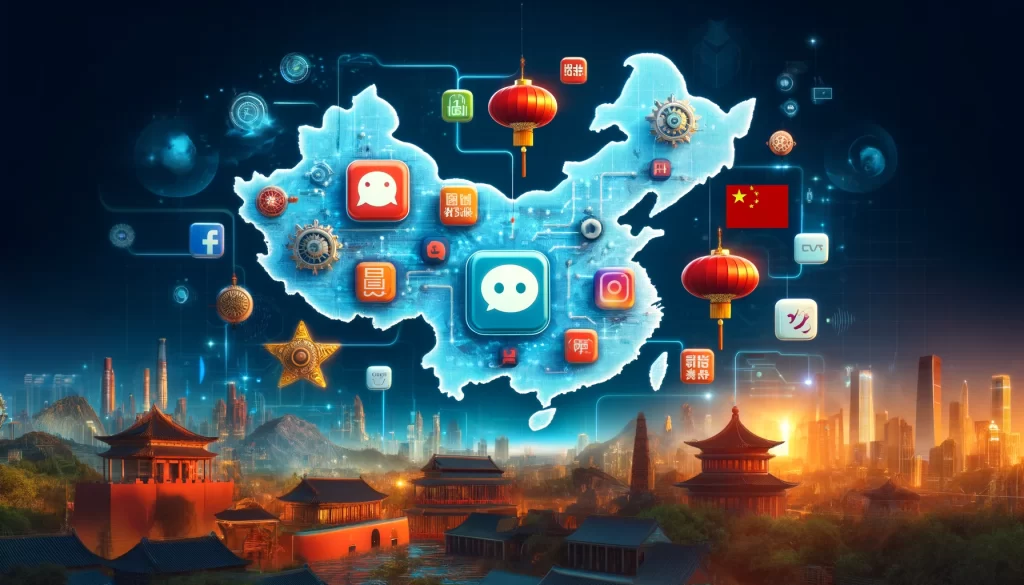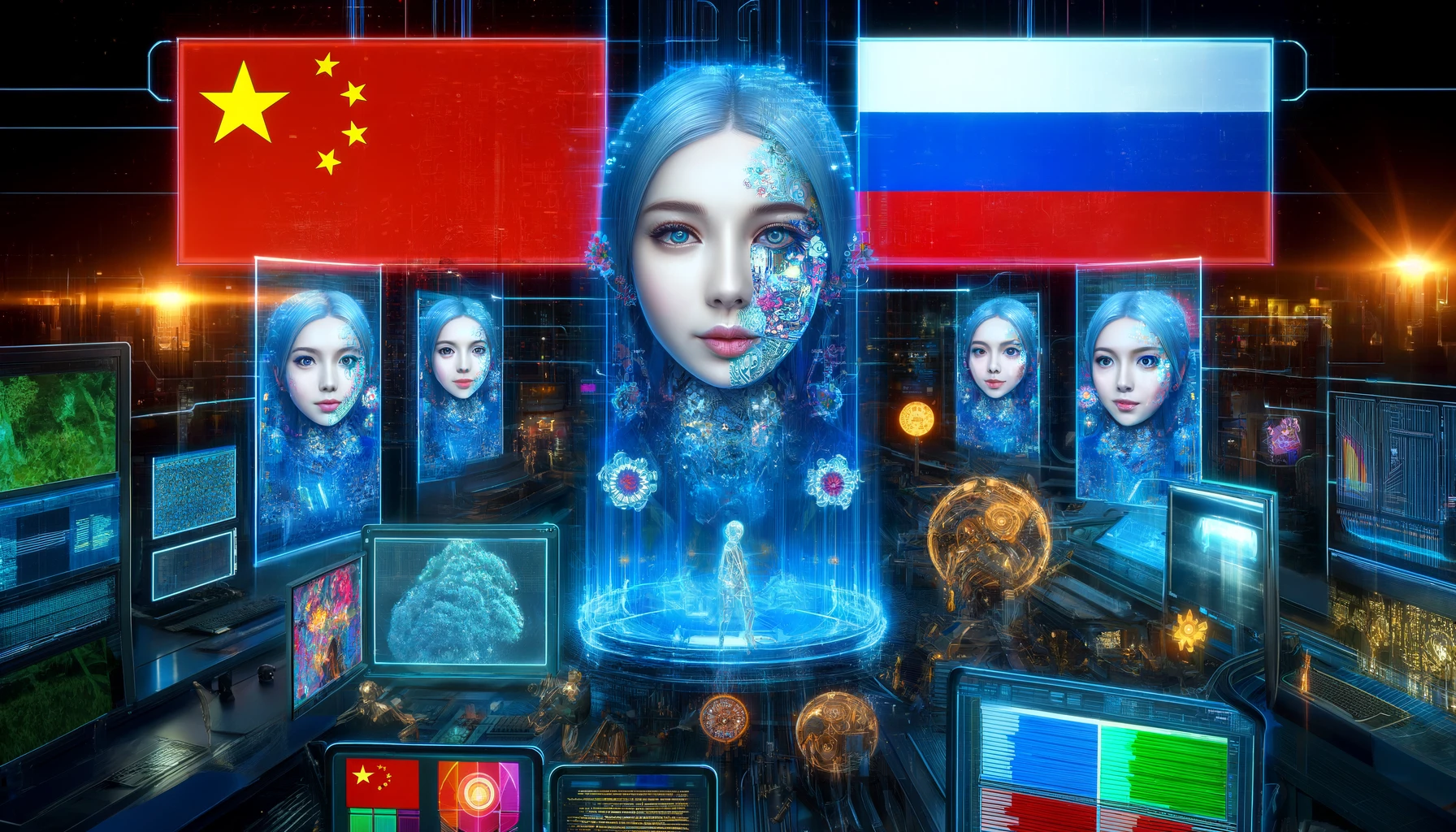Recently, Chinese social media has seen a surge in artificial intelligence (AI)-manipulated videos featuring young women who appear to be Russian. These videos aim to promote China-Russia relations, stoke patriotic feelings, and generate income.
The Content of the Videos
One prominent example is a video of a woman speaking Mandarin with a slight accent, suggesting that Chinese men should marry Russian women. In other clips, she praises Chinese food and markets Russian products like salt and soap. The woman, named “Ladina” on Douyin (a Chinese short video platform), is actually Shadé Zahrai, an Australian career strategist with over 1.7 million TikTok followers. Her videos have been altered using AI to make it seem like she is endorsing Russian products. The lip movements in these videos do not match the audio, revealing the manipulation.
Another set of videos features a blonde woman expressing gratitude for China’s support during Russia’s economic difficulties. She praises the Chinese people and language, saying, “I really envy my Chinese friends. You’re born with the world’s most precious identity and most profound and charming language.” In another video, she thanks the Chinese for buying Russian chocolates, stating, “In the past year, the entire world is boycotting Russia, imposing all kinds of restrictions and difficulties on us. China is like a savior.” These videos are derived from Olga Loiek, a Ukrainian college student who creates content about self-improvement and her gap year in Germany. Ms. Loiek does not speak Chinese and would never praise Russia in such a manner, as she has relatives in Ukraine.
The Objectives
The primary goal of these videos appears to be commercial. Many videos eventually direct viewers to product links, indicating a marketing motive. The target audience seems to be nationalist Chinese men, who find both nationalistic and masculine pride in consuming this content. Videos are tagged with terms like “Russian wife” and “Russian beauty,” and feature women expressing admiration for Chinese men and their accomplishments, or pleading to be rescued from poverty or less idyllic countries.
Geopolitical and Technological Context
The deepening relationship between China and Russia provides a backdrop for these videos. Leaders Xi Jinping and Vladimir Putin have declared a “no limits” partnership amid increasing hostility from the West. Nationalist content has become a reliable driver of internet traffic in China, especially in a censorship environment where many topics are off limits. The use of foreign faces to praise China taps into national pride and nationalism, which can also carry a strain of sexism.

Chenchen Zhang, a professor of international relations at Durham University in England, explains, “This representation of young white women in sexually objectified ways is a typical trope of gendered nationalism, or nationalistic sexism. Viewers can get both their nationalistic and masculine pride reaffirmed in consuming this content.”
The Technology Behind the Videos
AI technology has advanced significantly, allowing for realistic manipulations. Some videos use entirely computer-generated faces, while others modify real people’s videos, such as those of Ms. Zahrai and Ms. Loiek. Despite the technological advancements, some videos remain of poor quality, which may make the alterations obvious to viewers. For instance, Ms. Zahrai’s management company stated that the AI modifications were “poor quality” and would likely appear fake even to casual viewers. However, some videos, like those using Ms. Loiek’s likeness, are very realistic, making the manipulation more convincing and harder to detect.
Government and Platform Response
While the Chinese government has promoted online nationalism, there is no evidence of its involvement in creating these deepfake videos. However, local governments and real Russian influencers have participated in similar promotional activities. Recently, social media platforms in China have started to scrutinize AI-generated content more closely, removing or labeling such videos. China was the first country to enact regulations around generative AI, and on paper, its policies are stricter than those in the West.
Ethical and Legal Concerns
The use of AI-manipulated videos raises ethical and legal issues. Many individuals whose images are used without permission, like Ms. Loiek, find it alarming and intrusive. Ms. Loiek reported over 30 different social media accounts in China using her image. She made a YouTube video about her experience, which led to most profiles using her likeness being shut down. Despite regulations, enforcement remains challenging, especially within China’s closed internet environment. Foreign influencers may not be aware their image has been used on Chinese social media, making it difficult to file copyright complaints.
Future Implications
As AI technology becomes more accessible, the use of deepfakes for commercial purposes is likely to increase. Many video creators are taking advantage of China’s embrace of shopping via livestreaming and short videos. AI-generated videos save costs compared to real salespeople, making them an attractive option for businesses. Professor Haibing Lu from Santa Clara University suggests that AI-manipulated videos will become more common as a sales tactic, saying, “The people behind this would manipulate any possible topic to attract people’s attention. Show ‘how to go to top schools’ to parents; ‘how to become beautiful,’ to young ladies. I believe going forward, everyone will use AI technology to customize topics to make videos appealing to a certain audience.”
This article is based on the following article:

Background Information
1. What are Deepfakes?
Deepfakes are digitally manipulated videos or audio recordings that use artificial intelligence (AI) to create realistic but fake content. This technology can swap faces, alter voices, and create entirely new scenes that look and sound authentic. Deepfakes are created using machine learning algorithms, especially those known as generative adversarial networks (GANs), which can produce high-quality forgeries by learning from vast amounts of data.
2. The Rise of AI Technology
Artificial intelligence has rapidly advanced in recent years, becoming more accessible and sophisticated. AI applications range from virtual assistants like Siri and Alexa to more complex uses such as self-driving cars and medical diagnosis. In the context of media, AI can now create realistic images, audio, and videos, leading to the rise of deepfake technology.
3. Social Media Platforms in China
China has a unique social media landscape dominated by platforms like WeChat, Weibo, Douyin (the Chinese version of TikTok), and Xiaohongshu (similar to Instagram). These platforms have massive user bases and are integral to daily life in China. Douyin, for example, is known for its short video content and has become a major platform for influencers and e-commerce.
4. China-Russia Relations
China and Russia have strengthened their political and economic ties in recent years. Both countries have faced increasing pressure and hostility from Western nations, prompting them to declare a “no limits” partnership. This alliance is characterized by cooperation in various fields, including energy, technology, and defense. The deepening relationship between the two countries sets the stage for the nationalistic content seen in AI-manipulated videos.
5. Nationalism in China
Nationalism, or strong patriotic sentiment, has been rising in China. The government often encourages this sentiment to foster unity and pride among its citizens. Nationalistic content tends to receive high engagement on social media, making it a powerful tool for influencing public opinion. However, this nationalism can sometimes include sexist elements, as seen in the portrayal of foreign women in AI-manipulated videos.
6. The Role of Influencers
Influencers are individuals who have gained a large following on social media platforms. They often promote products, lifestyles, and ideas to their audience. In China, influencers play a significant role in e-commerce, with many people buying products based on their recommendations. This phenomenon has led to the rise of livestream shopping and short video marketing, where influencers demonstrate and sell products in real-time.
7. Ethical and Legal Concerns with Deepfakes
The creation and distribution of deepfakes raise several ethical and legal issues. Using someone’s likeness without permission can be considered a violation of privacy and intellectual property rights. Deepfakes can also spread misinformation and cause harm by portraying individuals in ways that are false or damaging. Various countries, including China, are developing regulations to address these concerns, but enforcement remains a challenge.
8. The Impact of AI on Employment
AI technology is changing the job market, especially in sectors like customer service, retail, and media. In China, some companies have already started using AI-generated characters as salespeople to cut costs. This shift highlights the broader impact of AI on employment, as machines and algorithms increasingly perform tasks traditionally done by humans.
9. Global Perspectives on AI and Deepfakes
Different countries have varying approaches to regulating AI and deepfakes. While China has implemented some of the strictest regulations on generative AI, enforcement is complex due to the vast and rapidly evolving digital landscape. Other countries are also grappling with how to balance innovation with the need to protect individuals from the potential harms of deepfake technology.
10. The Future of AI-Generated Content
As AI technology continues to evolve, the creation of deepfakes and other AI-generated content is expected to become more prevalent. This trend poses challenges for verifying the authenticity of digital media and protecting individuals’ rights. It also presents opportunities for innovation in fields like entertainment, education, and marketing, where realistic AI-generated content can enhance user experiences.

Debate/Essay Questions
- Do the benefits of AI in e-commerce outweigh the potential job losses due to the replacement of human salespeople with AI-generated characters?
- Many agree that deepfakes pose serious danger in many areas of society. Should they be completely banned or just heavily regulated to allow limited uses for education and entertainment?
Please subscribe to Insight Fortnight, our biweekly newsletter!
